Ultimate Guide to Garden Maintenance in Upminster
Introduction to Garden Maintenance
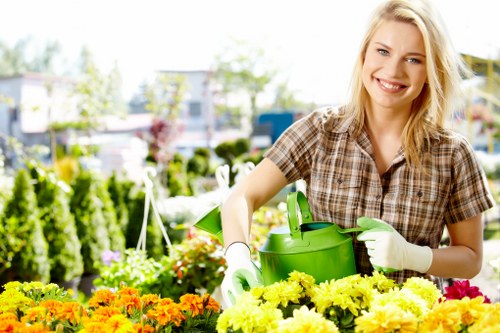
Maintaining a beautiful garden in Upminster requires a combination of **skills**, knowledge, and dedication. Whether you're a seasoned gardener or a beginner, understanding the fundamentals of garden upkeep can transform your outdoor space into a serene and thriving environment.
Upminster's climate and soil conditions play a crucial role in determining the types of plants that will flourish. By tailoring your garden maintenance practices to the local environment, you can ensure a vibrant and healthy garden all year round.
In this comprehensive guide, we'll explore essential garden maintenance tips, seasonal tasks, and professional services available in Upminster to help you achieve and sustain a picturesque garden.
Seasonal Garden Maintenance
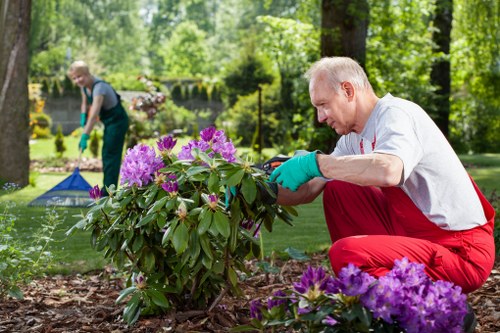
Successfully maintaining a garden requires adapting your care routine to the changing seasons. Each season brings its unique challenges and opportunities for garden enhancement.
Spring Maintenance
Spring is a time of renewal and growth. Begin by clearing out any debris accumulated over the winter months.
- Prune overgrown shrubs and trees.
- Prepare soil by adding compost or fertilizer.
- Plant new flowers and vegetables to kickstart the growing season.
Regular watering and monitoring for pests are essential during this period to ensure healthy plant development.
Summer Maintenance
Summer brings warmer temperatures and longer days, which can accelerate plant growth but also increase the risk of drought and pests.
- Implement a consistent watering schedule, preferably in the early morning or late evening.
- Apply mulch to retain soil moisture and suppress weeds.
- Regularly check plants for signs of stress or infestation.
Autumn Maintenance
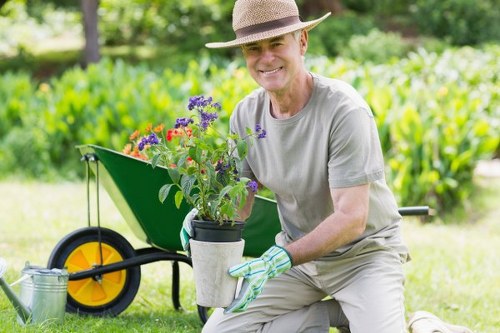
Autumn is the perfect time to prepare your garden for the colder months ahead.
- Rake fallen leaves to prevent mold and disease.
- Plant bulb flowers for spring blooms.
- Trim and clean up perennials to encourage healthy growth next year.
Winter Maintenance
Winter requires minimal maintenance but essential tasks to protect your garden.
- Protect delicate plants with frost covers.
- Store garden tools properly to prevent rust and damage.
- Plan and design your garden layout for the upcoming year.
By staying proactive during each season, you can ensure that your garden remains lush and vibrant throughout the year.
Essential Garden Maintenance Tasks
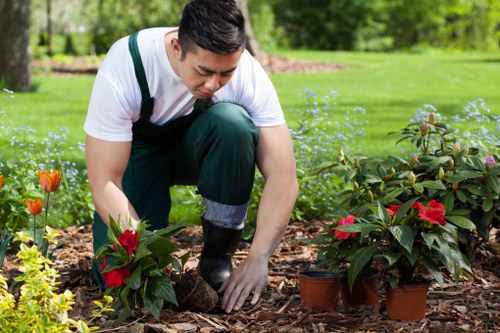
Consistent maintenance is key to a thriving garden. Here are some essential tasks that should be part of your regular gardening routine.
Weeding
Weeds compete with your plants for nutrients, water, and sunlight. Regular weeding prevents them from taking over your garden.
- Hand-pull weeds to avoid damaging plant roots.
- Use mulch to suppress weed growth.
- Apply organic or chemical weed control methods as needed.
Pruning
Pruning helps maintain the health and shape of your plants.
- Remove dead or diseased branches to prevent spread.
- Shape plants to encourage optimal growth and airflow.
- Prune flowering plants after they have bloomed to promote future blooms.
Watering
Proper watering is critical for plant health, especially during dry spells.
- Install an irrigation system for consistent watering.
- Use watering cans for targeted hydration.
- Monitor soil moisture levels to avoid over or under-watering.
Incorporating these tasks into your routine will help maintain a healthy and aesthetically pleasing garden.
Choosing the Right Plants for Upminster Gardens
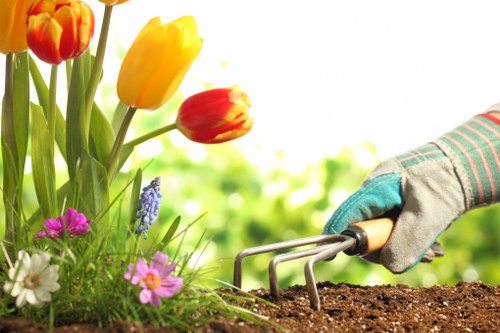
Selecting plants that are well-suited to Upminster's climate and soil conditions is vital for successful garden maintenance.
Climate Considerations
Upminster experiences a temperate climate with mild summers and cool winters. Choosing plants that thrive in these conditions will reduce maintenance efforts.
- **Perennials** such as lavender and geraniums offer year-round color.
- **Shrubs** like boxwood and hydrangeas provide structure and foliage.
- **Vegetables** like tomatoes and lettuces are well-suited for the local growing season.
Soil Health
Healthy soil is the foundation of a thriving garden. Regularly testing and amending your soil can address deficiencies and improve plant growth.
- Add compost to enrich soil with organic matter.
- Use lime or sulfur to adjust pH levels as needed.
- Incorporate mulch to maintain moisture and prevent erosion.
By selecting the right plants and maintaining healthy soil, you can create a resilient and vibrant garden.
Low-Maintenance Plants
If you prefer a garden that requires minimal care, opt for low-maintenance plants that are hardy and resistant to pests.
- Succulents and cacti are drought-tolerant and require little watering.
- Native plants are adapted to local conditions and support biodiversity.
- Evergreen plants provide year-round foliage with minimal pruning.
Native Plants in Upminster
Embracing native flora not only simplifies maintenance but also enhances the local ecosystem.
Benefits of Native Plants
- Require less water and fertilizers.
- Attract local wildlife, including pollinators.
- Resilient to local pests and diseases.
Incorporating native plants into your garden can lead to a sustainable and low-maintenance landscape.
Professional Garden Maintenance Services in Upminster

While DIY garden maintenance can be rewarding, professional services offer expertise and efficiency, ensuring your garden remains in top condition.
Benefits of Hiring Professionals
- Expert knowledge of local plants and conditions.
- Access to specialized tools and equipment.
- Time-saving and reliable maintenance schedules.
Services Offered
Professional garden maintenance companies in Upminster provide a wide range of services tailored to your specific needs.
- Lawn Care: Mowing, fertilizing, aerating, and pest control.
- Pruning and Trimming: Shaping shrubs, trees, and hedges.
- Planting and Landscaping: Designing and installing new garden features.
- Weed Control: Comprehensive weed management strategies.
- Seasonal Cleanup: Preparing your garden for changing seasons.
Choosing the Right Service
Consider the following factors when selecting a garden maintenance service in Upminster:
- Experience and reputation in the local area.
- Range of services offered to meet your specific needs.
- Competitive pricing and transparent quotes.
- Customer reviews and testimonials.
Investing in professional garden maintenance can enhance the beauty and health of your garden, allowing you to enjoy a pristine outdoor space without the hassle.
DIY Garden Maintenance Tips

For those who prefer a hands-on approach, here are some practical DIY garden maintenance tips to keep your Upminster garden thriving.
Regular Inspection
Frequent checks help identify issues early, preventing minor problems from escalating.
- Inspect plants for signs of pests or diseases.
- Check soil moisture levels regularly.
- Monitor plant growth and health.
Efficient Watering Techniques
Proper watering practices conserve water and promote healthy plant growth.
- Use drip irrigation systems for targeted watering.
- Water plants deeply but less frequently to encourage strong root systems.
- Avoid watering during the hottest parts of the day to reduce evaporation.
Composting
Composting is an eco-friendly way to recycle garden waste and enrich your soil.
- Collect kitchen scraps and garden trimmings.
- Maintain a balanced mix of green and brown materials.
- Turn the compost regularly to speed up decomposition.
By implementing these DIY strategies, you can maintain a beautiful and sustainable garden with minimal effort.
Garden Tools and Equipment

Having the right tools and equipment is essential for effective garden maintenance.
Basic Tools Every Gardener Needs
- Pruners and Shears: For trimming and shaping plants.
- Garden Fork: For turning soil and aerating beds.
- Hand Trowel: For planting and transplanting.
- Watering Can or Hose: For watering plants efficiently.
- Gloves: To protect your hands while working.
Advanced Equipment
For more extensive garden projects, consider investing in advanced tools.
- Rotary Tillers: For preparing large garden beds.
- Lawn Mowers: For maintaining grassy areas.
- Chainsaws: For pruning large trees.
- Leaf Blowers: For efficient cleanup.
Maintaining your tools is just as important as using them. Regular cleaning and proper storage extend their lifespan and ensure optimal performance.
Eco-Friendly Tools
Adopting eco-friendly garden tools can reduce your environmental footprint.
- Use manual tools instead of gas-powered ones to minimize emissions.
- Opt for tools made from sustainable materials.
- Recycle or repurpose old tools responsibly.
Equipping yourself with the right tools enhances your garden maintenance efficiency and sustainability.
Storage Solutions
Proper storage solutions protect your tools from the elements and prevent rust.
Organized Storage Tips
- Install a shed or dedicated storage area.
- Use wall-mounted racks and hooks to maximize space.
- Keep tools clean and dry before storing them.
By organizing your tools effectively, you ensure they are always ready for your next gardening task.
Lawn Care in Upminster

A well-maintained lawn is the centerpiece of any beautiful garden. Here are some lawn care tips tailored for Upminster's climate.
Mowing Techniques
Proper mowing practices promote a healthy and lush lawn.
- **Frequency:** Mow regularly, removing no more than one-third of the grass blade each time.
- **Height:** Maintain an appropriate grass height for the specific type of lawn.
- **Blade Maintenance:** Keep mower blades sharp to ensure clean cuts.
Fertilization
Fertilizing your lawn provides essential nutrients for growth and resilience.
- Choose a fertilizer that suits your grass type and soil conditions.
- Apply fertilizer in the spring and autumn for optimal results.
- Follow recommended application rates to avoid over-fertilization.
Weed and Pest Control
Managing weeds and pests is crucial for maintaining lawn health.
- Identify common lawn weeds and use appropriate control methods.
- Implement natural pest control solutions to minimize chemical use.
- Regularly aerate the soil to improve root health and reduce pest infestations.
Consistent lawn care ensures a resilient and attractive grassy area that enhances the overall appeal of your garden.
Garden Irrigation Systems

Efficient irrigation is vital for maintaining a healthy garden, especially during dry spells.
Types of Irrigation Systems
- Drip Irrigation: Delivers water directly to plant roots, minimizing waste.
- Sprinkler Systems: Ideal for covering large areas uniformly.
- Soaker Hoses: Provide gentle watering for garden beds and borders.
Choosing the Right System
Select an irrigation system based on your garden size, plant types, and water availability.
- Consider automated systems for convenience and consistency.
- Evaluate water pressure and flow rate to ensure optimal coverage.
- Incorporate rain sensors to adjust watering schedules based on weather conditions.
Maintenance of Irrigation Systems
Regular maintenance of your irrigation system ensures its efficiency and longevity.
- Check for leaks and clogs regularly.
- Adjust sprinkler heads and drip emitters as plants grow.
- Seasonally winterize the system to prevent damage from freezing temperatures.
Implementing an effective irrigation system can save water and reduce manual watering efforts, contributing to a sustainable and easily maintainable garden.
Pest and Disease Management

Protecting your garden from pests and diseases is essential for plant health and longevity.
Common Garden Pests in Upminster
- Aphids: Small insects that sap plant juices.
- Slugs and Snails: Cause damage to leaves and stems.
- Whiteflies: Spread plant viruses and weaken growth.
Natural Pest Control Methods
Using eco-friendly methods minimizes harm to beneficial insects and the environment.
- Introduce beneficial insects like ladybugs and lacewings.
- Use neem oil or insecticidal soaps to manage infestations.
- Implement companion planting to deter pests naturally.
Disease Prevention and Treatment
Preventing and addressing plant diseases ensures the overall health of your garden.
- Implement crop rotation in vegetable gardens.
- Ensure proper spacing for adequate airflow.
- Remove and dispose of infected plant parts promptly.
Proactive pest and disease management strategies keep your garden thriving and reduce the need for chemical interventions.
Mulching for a Healthy Garden

Mulching is a simple yet effective practice that offers numerous benefits for your garden.
Benefits of Mulching
- **Water Conservation:** Retains soil moisture, reducing the need for frequent watering.
- **Weed Suppression:** Inhibits the growth of unwanted plants.
- **Temperature Regulation:** Keeps soil temperatures stable, protecting roots.
Types of Mulch
Choosing the right type of mulch depends on your garden's specific needs and aesthetic preferences.
- Organic Mulch: Includes materials like bark, straw, and compost. It enriches the soil as it decomposes.
- Inorganic Mulch: Comprises materials such as gravel and rubber. It lasts longer but doesn't improve soil fertility.
- Living Mulch: Groundcovers that provide natural coverage while enhancing biodiversity.
Application Tips
Proper mulching techniques maximize the benefits and prevent potential issues.
- Apply a layer of mulch 2-4 inches thick around plants.
- Avoid piling mulch against plant stems or tree trunks to prevent rot.
- Refresh mulch annually to maintain its effectiveness.
Incorporating mulching into your garden maintenance routine fosters a healthier and more resilient garden ecosystem.
Composting and Soil Health

Composting is a sustainable practice that enhances soil fertility and supports plant growth.
Benefits of Composting
- Reduces household waste by recycling organic materials.
- Improves soil structure and fertility.
- Promotes beneficial microbial activity in the soil.
How to Start Composting
Setting up a compost system is straightforward and can be done in various ways.
- **Bin Composting:** Use a dedicated bin to contain and manage compost materials.
- **Pile Composting:** Create a compost heap in a designated area of your garden.
- **Tumbler Composting:** Utilize a rotating container for easier turning and mixing.
Compost Maintenance
Maintaining your compost ensures efficient decomposition and high-quality compost.
- Balance green (nitrogen-rich) and brown (carbon-rich) materials.
- Turn the compost regularly to aerate and speed up the process.
- Monitor moisture levels to keep the compost damp but not waterlogged.
By integrating composting into your garden maintenance, you contribute to a healthier environment and more productive garden soil.
Using Compost in the Garden
Apply finished compost to your garden beds to enrich the soil and support plant health.
Application Methods
- **Top Dressing:** Sprinkle compost on the soil surface around plants.
- **Soil Amendment:** Mix compost into the soil when planting or preparing garden beds.
- **Mulching Substitute:** Use compost as a nutrient-rich mulch alternative.
Proper application of compost enhances soil quality and provides essential nutrients for robust plant growth.
Conclusion

Effective garden maintenance in Upminster involves a combination of seasonal care, proper plant selection, efficient watering, and proactive pest management.
Whether you choose to tackle garden tasks yourself or enlist the help of professionals, consistent and informed maintenance practices will ensure your garden remains a beautiful and healthy sanctuary.
Ready to transform your garden? Contact us today or book your service now to experience expert garden maintenance tailored to your needs.
